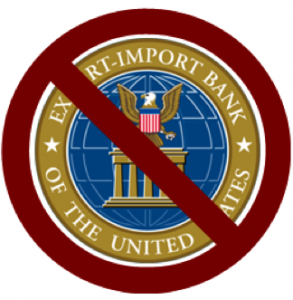
Billed as “the official export credit agency of the United States,” the Ex-Im Bank is an independent agency that was created decades ago to provide “aid in financing” to foreign entities and “to facilitate exports of goods and services, and in so doing to contribute to the employment of U.S. workers.”
Clearly the federal government cutting checks abroad to finance the purchase of American goods is not a core function of government. Nor are the loans doled out by this bank in anyone’s best interests (other than the companies which receive the subsidies, of course). In order to maximize prosperity, facilitate innovation and foster economic growth, the flow of capital across borders should be dictated by the global marketplace – not by government edict.
Yet given the pseudo-socialist world view that’s come to dominate decision-making in Washington, D.C., it’s not surprising that this vestige of Old Keynesianism is being given a costly New Keynesian spin.
Created during Franklin Roosevelt’s New Deal for the purpose of making loans to the Soviet Union, the Ex-Im Bank became a standalone government agency in 1945. Since then it has doled out hundreds of billions of dollars in foreign loans with little to no accountability. And while the bank claims that “in excess of 80 percent of our transactions directly benefit U.S. small businesses,” in reality it is nothing but a slush fund for politically-connected multinationals.
“In fiscal 2009, Ex-Im guaranteed $8.4 billion of loans to benefit Boeing, an astounding 90 percent of all of Ex-Im’s loan guarantees,” Timothy P. Carney of The Washington Examiner reported last summer.
The following year the Chicago-based aircraft manufacturer was awarded $6.4 billion in loan guarantees — or 63 percent of the total Ex-Im loan guarantees that year.
No wonder Boeing rushed to cut a deal with Barack Obama’s rabidly pro-union National Labor Relations Board (NLRB) when the agency threatened the company in 2011.
Currently Obama’s administration — with Boeing’s aggressive support — is seeking an extension of the Ex-Im Bank’s authorization and a major expansion of its borrowing capacity. Of course this four-year, $140 billion proposal isn’t being offered as a standalone piece of legislation. Senate Majority Leader Harry Reid has instead chosen to attach it as an amendment to a popular bipartisan bill designed to eliminate regulatory barriers for small businesses.
Increasingly, this is how the corporate cronyists in Washington, D.C. seek to pass all manner of anti-free market measures. They know it is politically toxic to seek approval for these items straight up — so they insert them as amendments to broadly-supported bills in the hopes that no one will notice (or risk objecting).
Also troubling is the so-called “opposition” to the Ex-Im Bank, which consists of a GOP proposal to reauthorize it for one year while raising its cap to $113 billion.
Neither of these plans is acceptable. This agency must be done away with altogether — immediately.
While certain U.S.-based companies like Boeing may benefit from the Ex-Im Bank’s loans —other U.S. companies are hurt by them. Take Delta, which was forced to scrap a popular international route because it could no longer compete with a foreign airliner that was receiving Ex-Im Bank subsidies.
Not only is this a bad outcome for Delta and its employees, it’s a bad outcome for consumers who must pay higher fares as a result of the reduced competition. No wonder Delta is currently suing the Ex-Im Bank for making loans that enabled Air India — its foreign competitor — to purchase Boeing jets at a substantially reduced interest rate. This sort of manipulation of the marketplace is rampant in the global economy — yet with occasional exceptions (like the Solyndra scandal) its drawbacks are rarely discussed.
In a collection of essays called The Morality of Capitalism, Kenyan entrepreneur June Arunga describes what happens when “international companies get special favors from governments.”
“These regulations restrict our markets and our freedom,” Arunga writes. “We are left purchasing goods and services that may not be of the highest quality or the best price, because we don’t have freedom of choice. That lack of freedom keeps us down and perpetuates poverty.”
Indeed. If we are going to reclaim our freedom and free markets, the Ex-Im Bank is one of many government entities that must be abolished immediately — and permanently.
The author is chairman of Americans for Limited Government.






